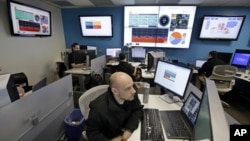Business leaders are calling on negotiators who will be at the U.N. climate change conference in Paris to take concrete action, with hundreds of major multinational corporations adding their names to petitions saying climate change is a real risk to their business.
They want policymakers to provide clear paths to address the problem, and one nearly unanimous recommendation is to put some kind of fee on carbon dioxide emissions.
But some corporations are not waiting for government action.
In 2012, software giant Microsoft saw the market for its products had changed. Packaged software was on the decline. Customers were increasingly doing their computing on remote servers. So the company planned a big expansion of its cloud-computing services.
But that created another issue, said sustainability chief T.J. DiCaprio: “We realized our energy consumption was going to be increasing significantly as we built data centers.”
More energy meant more carbon dioxide emissions. But, like others in the tech industry, Microsoft pledged to be carbon-neutral. The challenge to reduce the impact of data centers was getting business managers on board.
DiCaprio said that meant speaking their language, and shifting "from speaking about metric tons of carbon, which is a nebulous concept for the business people. It was much more direct to speak in terms of a dollar per metric ton and a charge on their profit-and-loss statement.”
So the company began tallying how much electricity their data centers consumed, multiplying that by how much carbon dioxide the power plants would produce and charging managers a fee per ton.
With a carbon tax on their balance sheets, DiCaprio said, managers found ways to cut energy use, like reducing server idling time and cooling data centers with more fresh air.
“That’s the beauty of this model with the price signal," she said. "It helps the managers understand that driving efficiency is critical.”
Major energy savings
Efficiency improvements were paid for with funds from the carbon tax. Microsoft has collected $30 million in the program’s first three years. It cut its carbon footprint by 7.5 million metric tons and saved more than $10 million a year in energy costs.
The company’s carbon tax also paid for planting trees in developing countries and other programs like providing efficient cookstoves that reduce firewood demand.
DiCaprio said almost no one seems to mind paying. Rather, employees are excited that the company shows environmental responsibility.
“I’m pleasantly surprised that the response from the managers has been so positive,” she said.
Microsoft is among the more than 1,000 corporations worldwide that have adopted internal carbon taxes or plan to in the next two years, according to a recent report.
Several energy companies are on that list. Although they don’t pay for their carbon emissions in the United States, they do in other countries.
And companies expect more will require it in the future, said Eliot Metzger of the World Resources Institute, an environmental research group.
“I think they’ve seen the writing on the wall and they recognize that this is a huge issue that’s going to affect their future markets," he said. "And they have to find a way to prepare for that.”
Internal carbon taxes can help them identify the most cost-effective ways to reduce their greenhouse gas emissions, he said, before governments do it for them.




